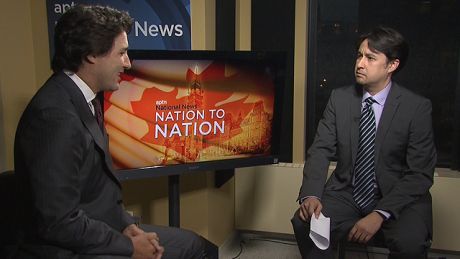News
You are here
Liberals and Indigenous rights: what next?

October 23, 2015
Indigenous people were part of the jump in voter turnout that drove Harper from office and that defeated his Aboriginal Affairs Minister Bernard Valcourt, who was the face for government indifference to missing and murdered Indigenous women. Trudeau has made some good promises on Indigenous rights, while also pushing tar sands pipelines that destroy Indigenous territories and violate sovereignty. Mobilizations outside Parliament will be key to both maintaining their promises and challenging their pipelines.
Among the many first-time voters were Indigenous peoples. There were 54 Indigenous candidates and 10 were elected: 8 Liberal and 2 NDP. AFN Grand Chief Bellegarde said his office is still working to confirm aboriginal voter turnout numbers, but estimates it jumped from 40 per cent to more than 50 per cent this year. Bellegarde said some First Nations bused members to the polling stations and some closed their band offices ahead of the election to rally communities to vote. Community members also launched a “Rock the Vote” campaign on social media to mobilize young people to vote.
As Grand Chief Sheila North Wilson, of Manitoba Keewatinowi Okimakanak, explained, “I believe that Mr. Harper, when he was prime minister, awoke a sleeping giant in our people, and that giant is awake. The new Liberal majority government under Mr. Trudeau is going to have to deal with a giant in the indigenous people of these lands."
Maintaining Liberal promises
On its website, the Liberals have promised to ensure a nation-to-nation relationship: “We will immediately re-engage in a renewed nation-to-nation process with Indigenous Peoples to make progress on the issues most important to First Nations, the Métis Nation, and Inuit communities—issues like housing, infrastructure, health and mental health care, community safety and policing, child welfare, and education…we will ensure that the Kelowna Accord—and the spirit of reconciliation that drove it—is embraced, and its objectives implemented in a manner that meets today’s challenges.”
Among other things, Trudeau promised to implement all recommendations of the Truth and Reconciliation Commission (TRC), to launch an inquiry into missing and murdered Indigenous women, to protect Indigenous languages, to fund the improvement of education infrastructure and schooling of Indigenous children and youth K-12, to remove the two per cent funding cap for services in First Nations communities, and to create a Federal Reconciliation Framework to help “settle land claims and treaties.”
Most of the above appears to be in line with priorities articulated by the Assembly of First Nations (see www.afn.ca “Closing the Gap”)—namely strengthening First Nations, families and communities, sharing and equitable funding, upholding rights, respecting the environment, revitalizing Indigenous languages, and implementing the TRC recommendations.
But we can’t take the Liberals at their word. It will require continued mobilization both to hold them to these promises and to shape the way they are implemented to ensure that Indigenous peoples have control over these processes. For example, will a national inquiry into missing and murdered Indigenous women be a top-down, state controlled academic exercise that pays lip service to Indigenous concerns—or a grassroots process where families of the victims and Indigenous communities are empowered to challenge the colonization of their territories that leads to violence against women?
Fighting Liberal pipelines
When it comes to tar sands pipelines, Trudeau has pledged to overhaul the pipeline review process to include climate impacts, opposed Northern Gateway pipeline and committed to end fossil fuels subsidies and invest in green infrastructure.
But, as 350.org has pointed out, “These are all amazing things, and campaign promises that Trudeau needs to keep. He also must understand that action on climate change means freezing expansion in the tar sands and committing to building a justice-based, clean energy economy. After all, it was only a week ago that we learned that the co-chair of Mr. Trudeau’s campaign was not only working for TransCanada Pipelines, but offering the company advice on how to quickly, and effectively lobby a Liberal government to get the Energy East pipeline built. That’s saying nothing of Trudeau’s support for the Keystone XL pipeline, his unclear stance on the Kinder Morgan pipeline, and his, frankly confusing, refusal to commit to ambitious climate targets on the campaign trail.”
In the first leader’s debate, Trudeau accused Harper of making the tar sands “a scapegoat around the world for climate change” and of eroding public trust in pipelines. He said that “the job of the Prime Minister is to get those resources to market” and that he would “restore public trust” and “make sure the right partnerships are in place” to promote tar sands. Attending Trudeau’s victory rally was one of the “partnerships” he was referring to: Phil Fontaine, former head of the AFN who now runs a consulting firm pipeline companies use to lobby First Nations and to claim Indigenous support. Despite these attempts, First Nations across the country are actively opposing pipelines through court cases, on-site land defense, blockades, and demonstrations—actions that Bill C-51, which Trudeau supports, seeks to criminalize.
Pierre Trudeau’s 1969 White Paper tried to forcibly assimilate First Nations, sparking the Red Power movement. Now, facing a new wave of Indigenous resistance, his son is trying to appeal to the movement while restraining it. It will take all of us, under the leadership of Indigenous activists, to combat the Liberal oil agenda.
Join the November 5-8 climate welcome sit-in at Prime Minister Trudeau’s residence.
Section:










